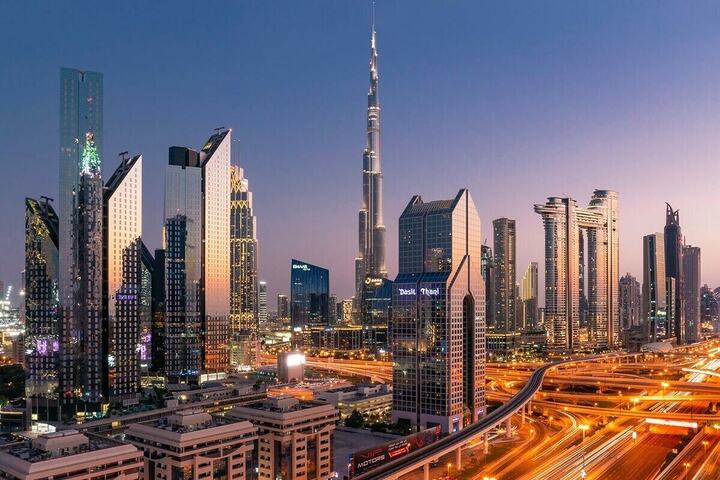The Hemani Group of Companies has some 2,000 products under its belt – including perfumes, skincare and cosmetics – across 48 outlets. It exports to some 80-plus countries.
But its beginnings can be traced back to a humble store in Karachi’s Jodia Bazaar. The shop was owned by now Dubai-based owner and CEO Mustafa Hemani’s father. Hemani’s first job was working in the shop as a peon, a time he remembers fondly.
He told Asma Mustafa Khan on Aaj News’ show In the Arena, which was aired on Monday evening, that he left his dreams of becoming a doctor because his father was sick and his sister said he needed to step up and take over the business.
‘A uniquely holistic choice’: is Dubai the perfect city to have a family office?
But Hemani had no interest in herbs. His father asked him what it is he did want to do, giving him full leeway to pursue his own interests. And so he ended up exporting confectionery back in the 1980s.
When that failed his father said: now what? And so Hemani began importing spices. That too did not work out. So he went into the ‘khopra’ (dried coconut) business, which did not end well.
To his father’s credit, he still let Hemani forge his own path. So Hemani decided to go into the auto sector, where he met with more failure. After a whole string of such incidents, finally he told his father: now I will do what you say.
His early days in the herbal business didn’t pan out too well either. He imported products from Sri Lanka and India but claims he was deceived by the suppliers, and lost money. However, this time his father told him that rather than leave the business, he needs to stick with it and figure out where he made mistakes.
“This is where you will make a profit.”
And profit he made. In fact, he says he was the only one at the time who was importing boatloads of herbs.
“I would sell them at good rates and I was doing really well.”
After some 11 years, due to security concerns, he headed to Dubai.
Dubai is a land of opportunity
Hemani arrived in Dubai in April 1995 with $600 in his pocket.
“Dubai was booming at the time. It is a land of opportunity and prosperity,” he said.
“People from all over the GCC would come to buy products from Dubai, as would buyers from Libya and Iraq, and former Soviet countries”.
Around this time, Hemani realised selling raw herbs wasn’t enough, he needed to pivot to value-added products.
“A new generation was coming up, the internet became common, exhibitions were held and the world was becoming smaller”
After realising one of his buyers was bypassing him and going straight to the supplier, he decided it was time to expand. He was trusted in the market and had many contacts who he could sell to.
Over the years, Hemani has set up seven factories in Pakistan: five for export goods and two for local trade. He believes his company has played a big role in showing the world that Pakistan has world-class herbal products.
It wasn’t an easy task. The first time he tried to sell kalonji oil with a ‘Made in Pakistan’ logo, he couldn’t sell a single bottle for three months. Now the company has acquired the ‘Emirates Quality Mark’ – given to those that meet UAE and international quality, safety, and environmental standards. Hemani says his firm is also approved by the US Food and Drug Administration and the EU.
Herbal products now make up 10 percent of the company’s products, while the rest are all value added goods.
In 2017 Hemani partnered with media personality Waseem Badami to open outlets that sell everything from hair oils to facial cleansers, perfumes and makeup.
At first, Hemani imported perfumes from Dubai to Pakistan but soon realised that perfumes could easily be made locally.
“The main component of perfume is ethanol, a by-product of sugar, which Pakistan has in abundance. In 2021 we set up the country’s biggest perfume factory and make our own perfumes as well as perfumes for other companies.”
Despite manufacturing locally, Hemani was still importing the ‘heart’ of the perfumes – a central phase of the scent that defines its main character – from European countries.
“I’ve been in the herbal industry for 40 years, I do all the research myself and make all the formulations myself.”
After two years of research, Hemani has finally figured out how to make the heart in Pakistan. Using this, in another six months, they intend to launch a new perfume brand.
Speaking of other future plans, Hemani said that “thanks to the UAE’s leadership we have acquired land in one of the free zones and we will start manufacturing some products here within one year.”
“When that happens, doors will open up even more. Your exposure opens up to 50 plus countries”.
According to him, this is because of the Comprehensive Economic Partnership Agreements that the UAE has signed with 20-plus countries and blocs, the pacts it has made with Arab League countries, as well as the GCC Agreement.
He added that on top of this, the UAE’s ‘Make it in the Emirates’ national strategy aimed at boosting local manufacturing means the government will help you in finding customers in various international markets, making Dubai the perfect place to set up the country’s next factory.
Copyright Business Recorder, 2025


